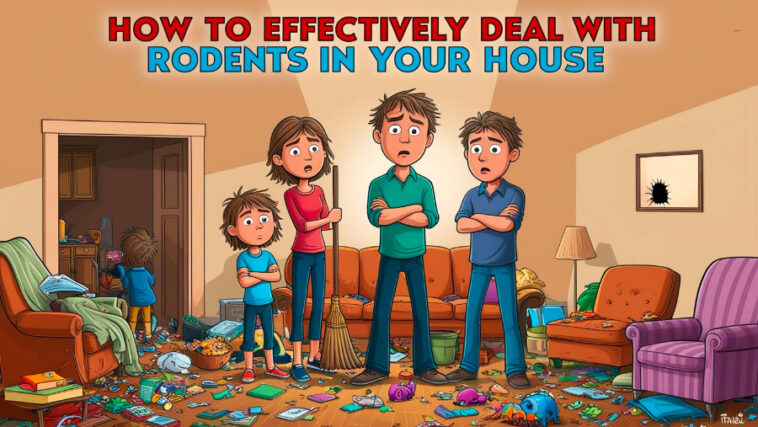Learn how to tackle and prevent rodent infestations in your home with our comprehensive guide. Discover effective strategies for rodent control, including the use of natural repellents, DIY traps, and proper home maintenance. Explore the importance of preventative measures and the benefits of professional pest control services to safeguard your home. By understanding rodent behavior and implementing these solutions, homeowners can maintain a rodent-free, safe, and healthy living environment.
Introduction to Rodent Issues in Homes
Rodent infestations are a prevalent issue faced by homeowners across the globe. The most common culprits include mice and rats, which often find their way into homes in search of food, shelter, and warmth. These creatures, while small in size, can cause substantial problems within a household.
Mice and rats typically infiltrate homes through small gaps and crevices, exploiting even the tiniest openings to gain entry. Once inside, they can be remarkably elusive, hiding in walls, attics, basements, and other concealed areas. Their presence can be detected by signs such as droppings, gnaw marks, and noise, especially at night when they are most active.
The potential harm posed by rodents extends beyond mere inconvenience. They are known to chew through electrical wiring, which poses a significant fire hazard. Additionally, they can damage insulation, wooden structures, and stored items, leading to costly repairs. More alarmingly, rodents are carriers of various diseases, including Hantavirus, Salmonella, and Leptospirosis, which can be transmitted to humans through direct contact or contamination of food and surfaces.
Understanding the severity of a rodent problem is crucial for homeowners. The rapid reproduction rate of mice and rats means that what begins as a minor issue can quickly escalate into a full-blown infestation if not addressed promptly. Effective rodent control measures are therefore essential to maintain a healthy and safe living environment.
As we delve deeper into this guide, we will explore various strategies to tackle rodent infestations, preventative measures to avoid future invasions, and the best practices for maintaining a rodent-free home. By implementing these strategies, homeowners can safeguard their residences against the significant and potentially dangerous complications associated with rodent infestations.
Understanding What Rodents Hate Most
Rodents are not just a nuisance; they can be a significant health hazard, contaminating food and spreading diseases. To keep them at bay, it is crucial to understand their dislikes. Rodents have a highly sensitive olfactory system, and certain smells can repel them effectively. One such natural rodent repellent is peppermint oil. Its strong scent overwhelms their senses, making it difficult for them to navigate and find food.
Another effective natural deterrent is ammonia. The pungent odor of ammonia mimics the scent of predator urine, which signals danger to rodents. Placing small bowls filled with ammonia around entry points or heavily infested areas can create an inhospitable environment for them. Additionally, the use of garlic and cayenne pepper can deter rodents, as these substances irritate their nasal passages and deter them from lingering.
Rodents also have specific food aversions. While they are omnivorous, certain foods can act as repellents. For example, capsaicin – the compound that makes chili peppers hot – is known to repel rodents. Foods containing high concentrations of sulfur, such as onions, also tend to keep them away. However, it’s important to note that while these foods can serve as temporary deterrents, they should be part of a broader rodent control strategy.
Environmental conditions also play a significant role in rodent deterrence. Rodents seek warm, humid places to nest. Thus, maintaining a clean and dry home environment is key. Regularly cleaning food crumbs, sealing garbage bins tightly, and de-cluttering storage areas can significantly reduce the likelihood of a rodent infestation. Repairing any cracks or gaps in walls, roofs, and foundations is also essential to prevent them from entering the house.
Incorporating these methods can help create a rodent-free home. By understanding what rodents hate most, homeowners can effectively deter these pests with natural repellents and proper home maintenance.
Preventive Measures to Keep Rodents Away
Preventing rodents from entering your home is far more efficient than dealing with a full-blown infestation. By taking a few strategic steps, you can significantly reduce the likelihood of rodents finding your home attractive. One of the most critical measures is sealing entry points. Rodents can squeeze through gaps and holes as small as a dime, so inspect your home meticulously. Use caulk, steel wool, or weather stripping to block potential access points around doors, windows, and plumbing fixtures.
Maintaining cleanliness is another essential preventive measure. Rodents are attracted to food and clutter, which provide ideal nesting sites. Ensure that your living areas are free of crumbs and spills by vacuuming and wiping down surfaces regularly. Pay special attention to kitchens and dining areas where food is present. Additionally, keep storage areas organized and clutter-free. Dispose of old newspapers, cardboard boxes, and other items that could serve as rodent nesting materials.
Proper food storage is crucial in deterring rodents. Store food in airtight containers, made of glass or thick plastic, to prevent access. This applies not only to human food but also to pet food and birdseed. Avoid leaving fruits, vegetables, or any perishable items out in the open. Moreover, do not forget about pantry essentials like flour, sugar, and cereal; these should also be kept in sealed containers.
Managing waste effectively can also help keep rodents at bay. Use trash cans with tight-fitting lids and dispose of garbage regularly. Make sure outdoor trash and recycling bins are well-maintained and kept away from the exterior walls of your home. Compost bins should be properly managed to avoid attracting rodents.
By implementing these preventive measures—sealing entry points, maintaining cleanliness, ensuring proper food storage, and managing waste—you fortify your home against potential rodent invasions. These practical and straightforward steps not only protect your home but also contribute to a healthier living environment.
Effective Home Remedies for Rodent Control
Managing and deterring rodents through home remedies can be both cost-effective and environmentally friendly. Natural repellents, DIY traps, and commonly found household items can serve as practical solutions to keep rodents at bay effectively. Here are some reliable home remedies that you can apply to safeguard your home from these uninvited guests.
One of the most popular natural repellents is peppermint oil. Rodents find the strong scent of peppermint overwhelming, making it an excellent deterrent. To use peppermint oil, soak cotton balls with the essential oil and place them in areas where rodent activity is suspected, such as near entry points, behind appliances, or inside cupboards. Reapply the oil every few days to maintain its effectiveness.
Another effective natural repellent is a mixture of vinegar and water. Combine equal parts of vinegar and water in a spray bottle and use this solution to clean surfaces and floors. The acetic acid in vinegar acts as a deterrent due to its sharp smell, which rodents dislike. Regularly cleaning with this solution helps in keeping rodents at bay.
DIY traps offer a more direct approach to rodent control. A simple method involves using a bucket, a wooden spoon, and some peanut butter. Smear peanut butter on the end of the spoon and balance it over the bucket, creating a makeshift teeter-totter. When a rodent attempts to reach the peanut butter, it will tip the spoon and fall into the bucket. This humane trap can be used to capture and release rodents away from your home.
Household items like steel wool and caulk are also invaluable in rodent control. Rodents can squeeze through small gaps and entry points to access your home. Filling these gaps with steel wool and sealing them with caulk prevents rodents from gnawing through and gaining entry. Pay special attention to areas around pipes, vents, and other potential access points.
Lastly, establishing good sanitation practices cannot be overstated. Keeping your home clean and free of food scraps minimizes the attraction for rodents. Store food in airtight containers and dispose of waste promptly to reduce the likelihood of infestation.
By implementing these home remedies, you can create an inhospitable environment for rodents, thereby protecting your home effectively using natural and practical methods.
Professional Pest Control Solutions
Hiring professional pest control services can be an effective strategy for dealing with rodents in your home. Specialized knowledge, equipment, and experience make professional exterminators particularly skilled in identifying the extent of an infestation, implementing effective solutions, and preventing future invasions. The primary methods employed by professionals include baiting, trapping, and chemical control, each tailored to the specific circumstances of the infestation.
Baiting is one of the most common and effective methods for rodent control. Professionals strategically place bait in areas with high rodent activity. This method usually involves using rodenticides, which are toxic to rodents but are carefully managed to minimize risks to humans and pets. Skilled pest control technicians understand the behavior patterns of various rodent species, enabling them to position baits effectively to maximize their impact.
Trapping is another critical method utilized by professionals. This approach includes various traps such as snap traps, glue traps, and live catch traps. Professionals determine the most suitable type of trap based on the specific type of rodent and infestation severity. Proper setup and regular monitoring are essential to ensure that trapping is both humane and effective.
Chemical control is often employed when infestations are particularly severe. Professional exterminators have access to chemicals that may not be available to the general public. These chemicals are highly effective and are applied according to stringent safety standards. Pest control experts ensure that treatments are carried out safely, targeting rodents while minimizing exposure risks to humans and pets.
Choosing a reliable pest control company involves several considerations. Recommendations from friends or online reviews can help identify reputable companies. Always verify that the company is licensed and insured. Confirm that technicians are certified and trained in the latest pest control techniques. A reliable company should provide a detailed treatment plan and offer warranties or follow-up services to ensure long-term effectiveness. By thoughtfully selecting a proficient pest control service, you can ensure a comprehensive and lasting solution to your rodent problem.
Maintaining a Rodent-Free Environment
Ensuring your home remains free of rodents requires more than a one-time effort; it necessitates ongoing maintenance. Regular home inspections play a critical role in this endeavor. Begin by frequently examining potential entry points such as cracks in the foundation, gaps around doors and windows, and vents. These can often serve as gateways for rodents. Sealing these entry points with caulk or weather stripping can significantly reduce the likelihood of an infestation.
Continued cleanliness practices are also paramount. Maintaining a clean home deters rodents from seeking food sources. Regularly vacuuming, sweeping, and wiping down surfaces can prevent crumbs and food residues from accumulating. It’s essential to store food in airtight containers and promptly dispose of garbage in sealed bins. Additionally, removing clutter from storage areas, garages, and attics can eliminate potential nesting sites for rodents.
Natural repellents or traps can serve as practical complements to these practices. Using peppermint oil, a known rodent deterrent, in areas suspected of rodent activity can be effective. Similarly, deploying ultrasonic repellent devices in strategic locations brings an added layer of protection. Traps, whether traditional snap traps or humane options, can be used periodically to monitor and control any potential rodent presence.
Periodic checks and maintenance should become habitual. Setting a monthly schedule to inspect and clean high-risk areas can help in keeping your home rodent-free. By integrating these practices into your regular home maintenance routine, you not only prevent infestations but also foster a healthier living environment. Employing these strategies collectively provides a comprehensive approach to maintaining a rodent-free home, ensuring peace of mind for you and your family.
Understanding Rodent Behavior for Better Control
Effectively controlling rodents in your house starts with a comprehensive understanding of their behavior. Rodents, particularly rats and mice, exhibit specific habits and nesting behaviors that, once understood, can provide critical insights for effective pest management. These small mammals are primarily nocturnal creatures, seeking food and shelter during the night. They are adept at finding entry points through holes as small as a quarter-inch for mice, and half an inch for rats.
Nesting behaviors are a vital aspect of rodent life cycles. Commonly, mice and rats prefer dark, secluded areas to build their nests. They utilize materials such as shredded paper, fabric, and insulation to construct their dwellings. These nests are typically located in attics, basements, or inside walls—areas that provide safety and proximity to food sources. Understanding these preferences can help homeowners identify potential nesting sites and take preventive measures.
Rodents are known for their rapid reproduction rates. Mice, for instance, can produce up to ten litters per year, with each litter containing six to eight pups. This exponential growth can quickly lead to significant infestations if not addressed promptly. Observing signs of rodent activity, such as droppings, gnaw marks, and tracks, is crucial in early detection and control efforts.
Furthermore, the feeding habits of rodents are crucial to understanding their behavior. These pests are opportunistic feeders, consuming a variety of human foods including grains, fruits, and meats. Their constant need to gnaw helps maintain their continuously growing incisors, leading to damage in household items and structures. Resistance to change and tendency to avoid new objects, known as neophobia, can complicate control measures like baiting.
Incorporating knowledge of rodent behavior into control strategies allows for a proactive approach to pest management. By identifying and addressing potential nesting sites, food sources, and entry points, homeowners can mitigate the risk of infestation and maintain a rodent-free environment.
Conclusion and Final Tips
Effectively managing rodent infestations in your home requires a multifaceted approach that prioritizes early intervention and consistent maintenance. Throughout this blog post, we’ve explored various strategies and methods for dealing with rodent issues, highlighting the importance of taking immediate action upon identifying signs of an infestation. These include setting traps, using deterrents, and sealing entry points to prevent future intrusions. Addressing the problem proactively not only minimizes potential damage to your property but also reduces health risks associated with rodent-borne diseases.
Preventative measures are crucial in keeping rodents at bay. Conducting regular inspections of your home, especially in areas prone to infestation such as basements, attics, and kitchens, allows you to detect early warning signs and take timely action. Ensuring that all food is stored in airtight containers and maintaining a clean living environment can deter rodents from seeking refuge in your home. Additionally, managing yard cleanliness and trimming overgrown vegetation helps minimize the habitats that attract rodents.
If preventive tactics and self-deployment of rodent control measures prove insufficient, seeking professional assistance might be necessary. Pest control experts possess the experience and tools required to effectively manage severe infestations. Their expertise not only ensures immediate relief but also helps implement long-term solutions tailored to your specific situation.
Finally, it’s essential to understand that dealing with rodents is an ongoing process. Regularly revisiting and updating preventive strategies will help safeguard your home against future incursions. The diligence put into rodent control will reflect in the safety and comfort of your living environment. By integrating early intervention, consistent maintenance, and professional assistance when needed, homeowners can effectively manage and prevent rodent infestations, ensuring a healthier and more secure home.




GIPHY App Key not set. Please check settings